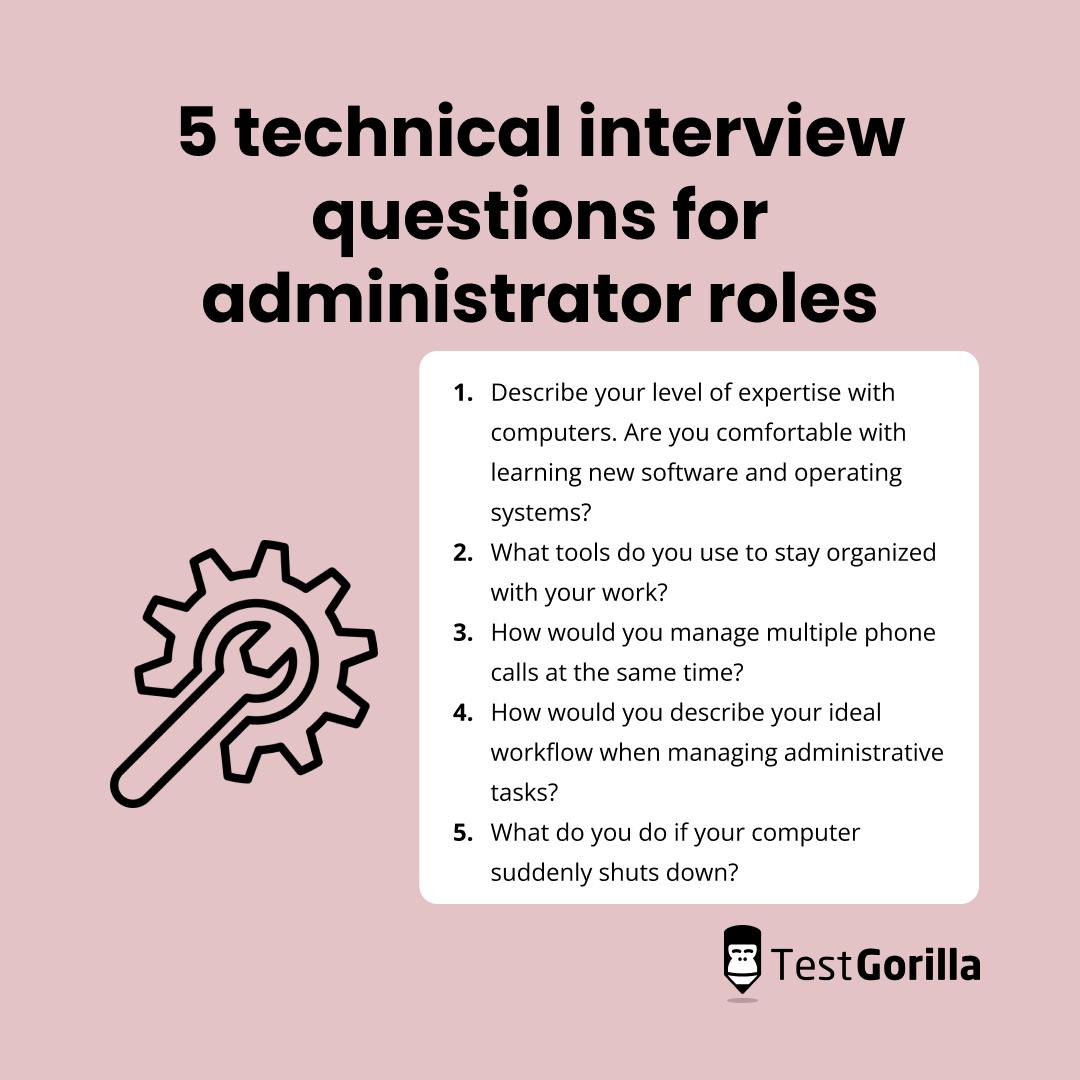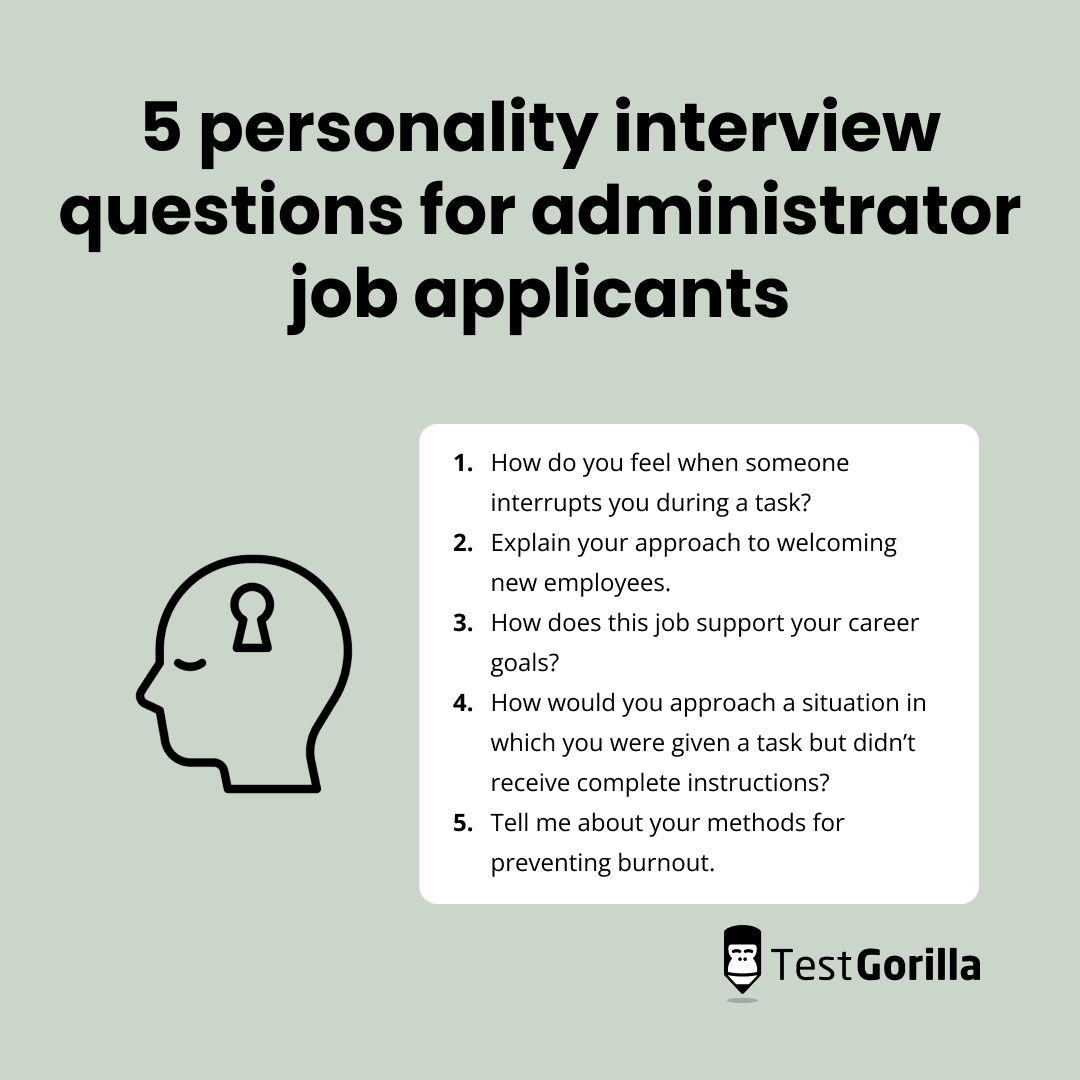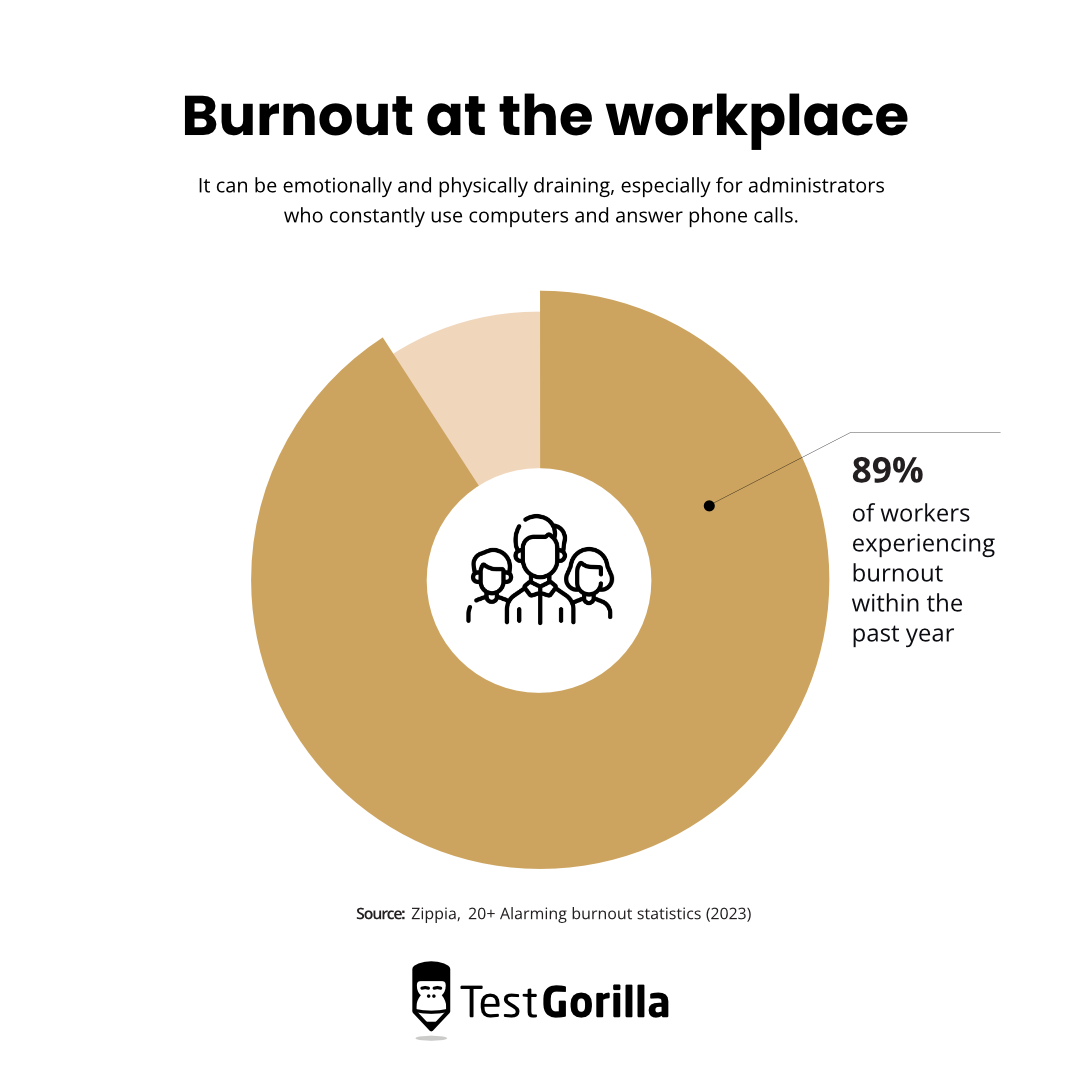50+ interview questions for administrator roles
Although asking general interview questions is a good practice, it’s more important to focus on role-specific questions that keep candidates engaged.
For example, asking questions like “What’s your biggest weakness?” or “Why should we hire you?” may not tell you much about their skills and personality. Instead, think about conversation starters that test applicants’ knowledge of administration.
Before delving into these questions, consider using skills tests in your hiring process, such as an administrative assistant test, to evaluate a candidate’s knowledge of computer software and administration practices. The Database Management and Administration test also evaluates a candidate’s knowledge of computer software and administration practices.
To fully understand your interviewees, it’s essential to choose relevant questions. Discover more than 50 interview questions for administrator roles and sample answers to help you choose the right candidate.
Table of contents
- 20 common interview questions for administrator jobs
- 6 sample answers to common interview questions for administrator professionals
- 15 technical interview questions for administrator candidates
- 5 sample answers to technical interview questions for administrator roles
- 16 personality interview questions for administrator positions in your company
- 5 sample answers to personality interview questions for administrator job applicants
- When you should use interview questions for administrator roles in your hiring process
- Use our skills tests and interview questions for administrator jobs to hire the right candidate
20 common interview questions for administrator jobs
Check out these 20 common interview questions for administrator jobs to help applicants feel comfortable. Make sure to choose questions based on candidates’ level of expertise, skills, and knowledge of standard administration tasks.
1. What software programs do you use on a daily basis?
2. Tell me about your experience with calendar management.
3. How do you communicate issues with your manager?
4. If you were given two high-priority tasks by your manager, how would you decide which one to complete first?
5. How do you deal with tight deadlines?
6. What tasks did you find most challenging in your previous position?
7. What is your typing speed and error rate?
8. Do you like working independently or as part of a team?
9. Describe a time you had to work with someone who didn’t agree with your ideas.
10. What is your preferred form of communication?
11. Have you ever had to manage other people? What strategies did you follow when taking on a leadership role?
12. Where do you see yourself in five years?
13. Can you describe the performance review process?
14. What is a vacation policy? What is a sick time policy?
15. What are your thoughts on and approach to taking minutes in a meeting?
16. Tell me about a time you made a mistake at work. How did you fix it?
17. Can you describe a typical day in your most recent position?
18. What are the top three skills an administrator needs to succeed?
19. What have you done in the past to foster communication within the office or with other departments?
20. What do you do first when tackling a large project?
Pro tip: Be sure to customize these questions to the specific role you’re hiring for. For instance, if you’re interviewing hospital administrator candidates, your questions should focus on learning about your candidates’ hospital administration skills. You might ask questions like, “What is your preferred form of communication with medical staff and departments?
6 sample answers to common interview questions for administrator professionals
Use these sample answers to common interview questions for administrator roles to help determine which candidates have the most experience.
1. How do you communicate issues with your manager?
Administrators should have strong communication skills, especially if they regularly collaborate with team members or speak to customers. They need to feel confident expressing concerns to a manager when facing a complex problem.
For example, the applicant may arrange a one-to-one meeting with their manager to explain their issue clearly.
Send candidates a Communication skills test to see how they communicate problems and use their active listening skills.
2. What is your typing speed and error rate?
A professional administrator may need to write reports, log digital records, and complete general word processing. They should have the ability to type fast to ensure they complete tasks on time throughout the day.
Candidates who make too many errors or struggle to write more than 60 words per minute may not have the skills to complete important administrative duties.
Use a Typing Speed test to determine how fast applicants can type words without making frequent mistakes.
3. Tell me about your experience with calendar management.
Calendar management involves creating and managing events, tasks, and appointments. An administrator must complete this process efficiently since they are responsible for organizing a company’s or manager’s schedule.
The ideal candidate will provide examples of how they manage important appointments to prevent conflicting meetings in the organization.
4. Tell me about a time you made a mistake at work. How did you fix it?
Everyone makes mistakes in the workplace. Interviewees should be honest about their errors and be able to discuss how they resolved them and grew from the experience. Focus on their critical-thinking skills and whether they have the right attitude to overcome administrative challenges.
For example, one candidate may talk about their experience with calendar management and how they failed to log the correct meeting date. To fix this, they notified the manager, changed the date, and scheduled other appointments around that meeting to avoid any conflicts.
5. Have you ever had to manage other people? What strategies did you follow when taking on a leadership role?
Administrators may need to take on a leadership role when guiding their team. Whether they adopt such a responsibility depends on the business and whether the administrator wants to complete a leadership development framework plan.
Top candidates will be able to discuss their experience managing employees and how they prefer to support the team during demanding times.
Use a Leadership & People Management test to determine whether your applicants can lead others and support team members.
6. Do you like working independently or as part of a team?
This question is particularly important if you’re seeking a team player. Some candidates may prefer to work independently, which is still acceptable but may not be suitable for your open position; ensure that any new hire can work well as part of the existing team.
Ask follow-up questions to learn more about their work ethic and whether they enjoy team collaboration in administration.
The best insights on HR and recruitment, delivered to your inbox.
Biweekly updates. No spam. Unsubscribe any time.
15 technical interview questions for administrator candidates
Below are 15 technical interview questions for administrator candidates. Choose questions that can help you assess their technical skills and computer knowledge.
1. Provide examples of spreadsheets you created in Excel.
2. What tools do you use to stay organized with your work?
3. Describe your level of expertise with computers. Are you comfortable with learning new software and operating systems?
4. How would you describe your ideal workflow when managing administrative tasks?
5. What experience do you have handling a large volume of phone calls?
6. How do you store confidential information in paper and digital form?
7. How would you manage multiple phone calls at the same time?
8. What computer skills do you have?
9. Talk me through the steps of arranging a company event.
10. Do you prefer communication via email?
11. Are you comfortable using Office, Excel, and other programs that help you complete administrative tasks?
12. What experience do you have with organizing meetings and events?
13. What do you do if your computer suddenly shuts down?
14. How did your previous team handle expense reports?
15. What types of documents do you have experience writing?
5 sample answers to technical interview questions for administrator roles
Revisit these sample answers to technical interview questions when choosing a candidate to fill your administrator position.
1. Describe your level of expertise with computers. Are you comfortable with learning new software and operating systems?
Administrators need to use computers to complete daily tasks. Without this knowledge, they cannot succeed in the position. It’s crucial that applicants have some experience with using computers and navigating different operating systems. They should also feel confident about learning new software upon starting the role.
You can send candidates an Active Directory test to see how effectively they use computer networks. Active Directory is a Microsoft directory service that provides authorization and authentication features to manage network resources in a distributed database.
2. What tools do you use to stay organized with your work?
There are many online tools that can help administrators organize their work. Administrators may use Google Docs or Microsoft OneNote to create to-do lists and complete their calendar management for the week.
Candidates with extensive knowledge of computer tools most likely have experience with administration tasks. Even if they don’t give examples of tools they currently use, they should still express their determination to complete training and learn new software in the role.
A Google Docs test will help you find out more about applicants’ technical skills and ability to create documents.
3. How would you manage multiple phone calls at the same time?
Typically, an administrator must deal with many phone calls throughout the day, and these calls are often with customers or important stakeholders. It is vital that candidates have strong time management skills to manage multiple phone calls at once.
Applicants might also show their ability to solve issues and delegate by passing some calls on to another team member to ensure they don’t leave customers waiting – this shows strong initiative and organizational abilities. Communication and problem-solving skills will also help them to complete phone calls quickly and successfully.
Send candidates a Time Management test to see if they can prioritize tasks and produce high-quality work without making mistakes.
4. How would you describe your ideal workflow when managing administrative tasks?
Candidates should discuss their methods for completing tasks. Their answers can tell you more about their mindset and methods for ensuring consistent productivity.
For instance, one applicant might create to-do lists to manage their workflow. Meanwhile, another candidate prefers to arrange meetings with team members to discuss upcoming projects. There isn’t a right or wrong answer, but you should use this question to better understand candidates’ time management and organization.
5. What do you do if your computer suddenly shuts down?
Administrators with strong technical skills will know how to handle computer issues. Since they work on a computer all day, they should have the skills and knowledge to overcome technical issues like power failures and error screens.
The ideal applicant will check the computer’s connection and restart it. They will also be able to check for updates to ensure the operating system is functional.
Use a Critical Thinking test to see how candidates solve complex problems using their deductive reasoning and analytical skills.
16 personality interview questions for administrator positions in your company
Here are 16 personality interview questions for administrator positions. You can use these questions to better understand an interviewee’s mindset, behavior, and approach to working with other team members.
1. How do you communicate with a large group of people?
2. Tell me about your methods for preventing burnout.
3. How do you feel when someone interrupts you during a task?
4. Can you name one professional achievement?
5. What do you enjoy about being an administrator?
6. How would you approach a situation in which you were given a task but didn’t receive complete instructions?
7. What type of office environment do you prefer?
8. Who do you go to when you need help at work?
9. How does this job support your career goals?
10. Tell me about a time when you needed to show discretion.
11. How would you handle a difficult client?
12. What are your goals for this role?
13. Explain your approach to welcoming new employees.
14. How do you reward employees working in your department?
15. Share a time you went out of your way to help your team.
16. Tell me about your greatest failure in the workplace.
5 sample answers to personality interview questions for administrator job applicants
Here are sample answers to personality interview questions for administrators. You can use them to compare interviewees’ responses after the interviews are complete.
1. How do you feel when someone interrupts you during a task?
This question can help you better understand the candidate’s mindset and approach to completing tasks efficiently. Distraction or interruption is frustrating, but it’s how applicants deal with it that is important.
For example, they could politely tell the team member that they are in the middle of a complex task and will arrange another time to speak to them. Being polite without getting angry is essential for maintaining employee morale and preventing unnecessary conflict.
2. Explain your approach to welcoming new employees.
Administrators may have to onboard new employees and make them feel welcome. This task is critical for enhancing the employee experience. Not having the right attitude or onboarding strategies could damage the organization’s reputation and candidate engagement.
Instead, the best applicants will show excitement about introducing new employees to the company. They might invite the employee to a social event or arrange a training day to ensure they’re happy and ready.
3. How does this job support your career goals?
You can become acquainted with candidates by asking about their career goals. They could share some of their personal development goals or explain how the administrator role will improve their skills and knowledge.
Applicants with the determination to succeed are more likely to progress in your business and hit targets. You can also use this question to determine whether the candidate plans to stay in the open position for only a few weeks or months.
4. How would you approach a situation in which you were given a task but didn’t receive complete instructions?
Administrators usually face unexpected or new tasks throughout the week. These could include last-minute projects that require urgent attention. Candidates should have the skills and determination to complete tasks outside of their comfort zone.
However, not everyone can start a project without clear instructions and business requirements. Therefore, the ideal applicant will be able to communicate this issue and any of their other needs with their manager. Identify interviewees who feel comfortable expressing their concerns regarding specific administrative tasks.
Send candidates a Big 5 (OCEAN) personality test to evaluate their openness, conscientiousness, extroversion, agreeableness, and emotional stability when facing problems in the workplace.
5. Tell me about your methods for preventing burnout.
Job burnout is widespread, with 89% of workers experiencing it within the past year. It can be emotionally and physically draining, especially for administrators who constantly use computers and answer phone calls.
That’s why it’s critical that candidates know how to prevent burnout and manage their stress.
Here are some ways to prevent burnout:
Take more breaks throughout the day
Talk with a manager about any personal issues
Prioritize work-life balance
Join more social events with team members
Actively manage time
Perform a job analysis
Focus on life outside of work
When you should use interview questions for administrator roles in your hiring process
You should use interview questions for administrator roles after giving applicants skills tests. Pre-employment skills assessments make your screening process easier and quicker. They help you determine which candidates have relevant knowledge and work experience for the open position in your company.
By using skills tests, you can also:
Reduce unconscious bias in hiring
Identify talented professionals
Engage with applicants
Fill skill gaps in your organization
Improve the hiring process
The skills tests you should use depend on the role you're hiring for and the exact skills it requires. For example, if you’re hiring a school administrator, you should use tests that assess essential skills for school administrators.
Choose some of the skills tests mentioned in this article to enhance your screening process and choose a talented candidate for your administrator role.
Use our skills tests and interview questions for administrator jobs to hire the right candidate
Our test library holds hundreds of data-driven skills tests for effective hiring. You can choose test types that range from personality to typing speed, so it’s easy to build an assessment tailored to your role.
Take a product tour to better understand our skills assessments and how they can help you discover the strongest candidates. We go more in depth regarding real-time assessment results and screening tools that encourage better hiring decisions.
So, what are you waiting for? Create a free account with TestGorilla, and hire a talented professional using our skills tests and list of interview questions for administrator roles.
You've scrolled this far
Why not try TestGorilla for free, and see what happens when you put skills first.





















